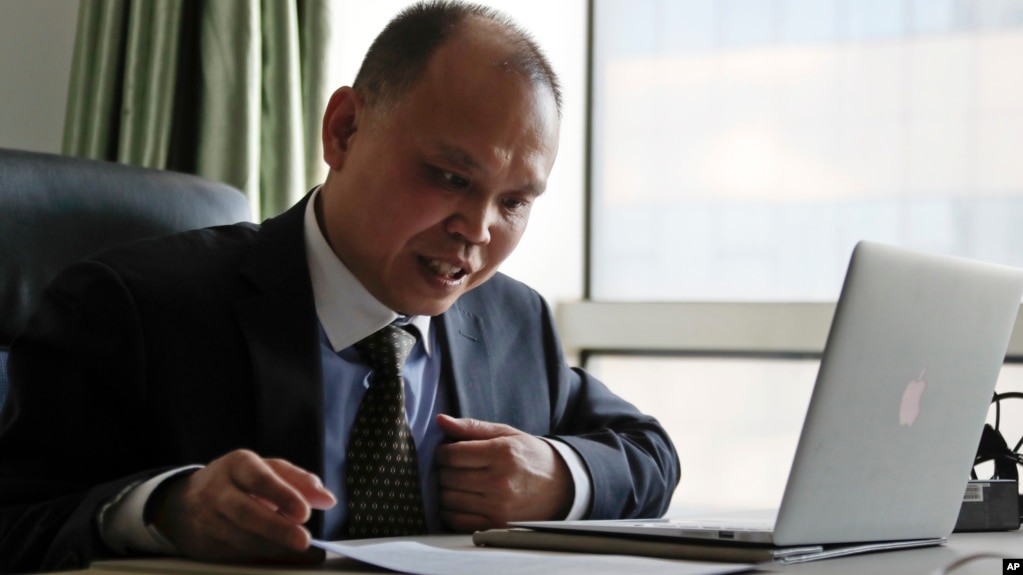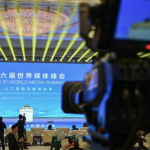
FILE – Chinese lawyer Yu Wensheng is seen working at his office in Beijing, Feb. 24, 2107. On Oct. 29, 2024, a court in Suzhou, China, sentenced the human rights lawyer and his wife, Xu Yan, to prison on charges including “inciting subversion of state power.”
taipei, taiwan —
A court in the eastern Chinese city of Suzhou on Tuesday sentenced Chinese human rights lawyer Yu Wensheng and his wife, Xu Yan, to prison.
Yu and Xu were detained by police in April 2023 while on the way to meet with high-level European officials visiting China. They were later charged with “picking quarrels and provoking trouble” and “inciting subversion of state power,” two crimes that Chinese authorities often use against dissidents.
Yu was sentenced to three years in prison, while Xu, who had already been detained for more than 18 months, could be released in January.
Their sentencing comes despite repeated efforts by the European Union and the U.N. Human Rights Council to draw attention to the case and call for their immediate and unconditional release.
Tuesday’s sentences will have a chilling effect within the community of rights advocates in China, analysts said.
“This case will likely deter other human rights activists from trying to meet with foreign diplomats because Yu and Xu were accused of colluding with foreign forces even though they didn’t make it to the scheduled meeting,” Patrick Poon, a visiting researcher at the University of Tokyo, told VOA by phone.
Prison hunger strike
Meanwhile, two jailed Chinese dissidents are protesting mistreatment, including around-the-clock monitoring and denial of contact with family.
Prominent Chinese dissident Xu Zhiyong, who was sentenced to 14 years in jail on the charge of “subversion of state power” last April, began a hunger strike after prison authorities instructed three other inmates in Xu’s cell to conduct around-the-clock monitoring, according to U.S.-based Chinese human rights lawyer Teng Biao.
“Since July, Xu has been required to get permission if he wants to go to the bathroom or leave his cell and whenever he leaves his cell, he will be closely followed by other inmates,” Teng told VOA by phone.
“Additionally, he has been forced to work in prison and deprived of phone calls as well as communicating with his family members through letters,” he said, calling the situation devastating for Xu’s mental health.
Rights advocates say police have harassed Xu’s family.
“Chinese authorities have repeatedly threatened Xu’s family members not to disclose details of his case and not to contact anyone abroad or else they would be detained,” said Sophie Luo, the wife of detained Chinese human rights lawyer Ding Jiaxi.
Teng worries the prolonged hunger strike, which started October 4, imperils Xu’s long-term well-being.
“I worry his physical and mental health will suffer irreversible damage,” Teng told VOA, adding that Xu has reportedly lost a lot of weight since beginning the hunger strike.
In response to Xu’s hunger strike, the Office of the United Nations High Commissioner for Human Rights said it is concerned about reports of the deterioration of his health.
“Our office has engaged with the Chinese authorities about his situation and urged for his immediate and unconditional release,” Thameen Al-Kheetan, public information officer at the Office of the United Nations High Commissioner for Human Rights, told VOA in a written response.
Pushing back
In addition to Xu, Chinese human rights lawyer Xie Yang, who has been in detention for more than 1,000 days, announced earlier this month that he won’t attend any court proceedings until his lawyer can access and copy his case files.
Some analysts say Xu and Xie hope to attract more attention to their cases through their protests to put more pressure on the Chinese government.
“The fierce resistance put forward by these dissidents may push the Chinese government to restore some of their basic rights, such as access to medical care, which would be an improvement from the original treatment that they were receiving,” Yaqiu Wang, research director for China, Hong Kong, and Taiwan at Freedom House, told VOA by phone.
In a post on the social media platform X, which is banned in China, U.S. Ambassador to China Nicholas Burns said Washington is “disturbed by reports that civil rights activist Xu Zhiyong is on a hunger strike in protest of inhumane treatment in prison.”
“We urge the PRC to release Mr. Xu and, in the interim, to treat him, and all prisoners, with dignity in accordance with UN member state obligations,” he wrote.
VOA requested comment from the Chinese Foreign Ministry and the Chinese Embassy in Washington but has yet to hear back. Beijing routinely dismisses criticism of its treatment of dissidents and human rights lawyers.
In a previous response to VOA, the Chinese Embassy in Washington said China is “a country ruled by law and liberty is protected and respected” in the country.
Fear of further persecution
In addition to Tuesday’s sentence and Xu’s hunger strike, Chinese human rights lawyer Lu Siwei was arrested earlier this month and charged with “illegally crossing the border” in the southwestern province of Sichuan.
Lu was repatriated back to China from Laos last year after trying to flee the country to reunite with his family in the United States.
His wife, Zhang Chunxiao, who lives in the U.S., told VOA that prison authorities have prevented family members from sending medications to Lu and some of his health problems may not be properly addressed.
“He told the lawyer that the quality of the meals is bad so I’m worried about his health condition and since he broke his right arm earlier this year, I also wonder whether the daily work in prison would affect his injury or not,” she said in a phone interview.
Based on the treatment that other Chinese dissidents in prison receive, Zhang worries that Lu may also experience torture or mistreatment while he waits for the final verdict.
“I’m very anxious and concerned because I don’t know what the Chinese authorities would do to my husband,” she said, adding that the international community should understand the charges or treatment against many Chinese human rights defenders like Lu are “unreasonable.”
By:VOA











